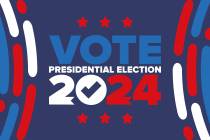Gibbons vetoes domestic partner bill
CARSON CITY — As promised, Gov. Jim Gibbons today vetoed the bill that would allow same- and opposite-sex couples to become legal domestic partners with many of the rights and privileges of married couples.
In his veto message, Gibbons said he rejected Senate Bill 283 because it is contrary to the wishes of Nevada voters who in 2002 approved the Protection of Marriage constitutional amendment. That amendment stipulates a marriage may be between only a man and a woman.
But the governor said his veto should not be taken to mean he believes that “domestic partners are in any way undeserving of rights and protections.”
He said that on Saturday he signed a bill to prevent discrimination in public accommodations based on one’s sexual orientation.
“I am disappointed, but it wasn’t unexpected,” said Sen. David Parks, D-Las Vegas, about the veto.
Parks, the bill’s sponsor who is openly gay, said times have changed since the Protection of Marriage amendment, and some polls show strong public support for domestic partner legislation.
However, a Las Vegas Review-Journal poll conducted May 12-14 found that 50 percent of poll respondents opposed the proposal, with 38 favoring it and 12 percent undecided. The poll, conducted by Mason-Dixon Polling & Research Inc., had a margin of error of plus or minus 4 percentage points.
Parks said that besides being a civil rights issue for those seeking domestic partnerships, SB283 is an economic issue.
Harrah’s Entertainment officials said last week that Las Vegas might lose the business of same-sex couples if the Legislature does not override the veto.
Nonetheless, Gibbons said that many of the rights domestic partners want “are readily available today by way of private contracts.”
He said he also signed a bill recently that makes it easier to secure a power of attorney, which will benefit domestic partners and all Nevadans who seek contracts that stipulate their wishes on a variety of matters.
But during legislative hearings, a lawyer testified that domestic partners seeking the rights and responsibilities of married couples have had to pay as much as $60,000 in legal fees. Parks said legal fees typically run about $5,000.
Nonetheless, Gibbons said last week that many forms people can use to secure private contracts are available for free or low cost on the Internet.
Parks now will try to muster enough votes in the Legislature to override the veto.
The bill passed the Senate 12-9, two votes short of the two-thirds needed to override a veto, and the Assembly 26-14, also two votes short.
“Do I have the votes right now?” Parks said Monday. “I can’t say. I am hopeful when it comes to the Senate for consideration that I will have them.”
An attempt to override the veto would begin in the Senate, and be forwarded to the Assembly only if 14 or more senators vote for the override.
Under the bill, couples would pay a fee to the secretary of state to secure a domestic partnership contract entitling them to make will, inheritance, health care, funeral and other decisions that are now made by spouses in marriages.
But the bill specifies that a domestic partnership is not a marriage as defined by the constitutional amendment, which was passed by more than two-thirds of voters seven years ago.
While Parks secured a legislative legal opinion that his bill is not unconstitutional, Gibbons said SB283 is of “suspect constitutionality.”
“I believe because the voters have determined that the rights of marriage should apply only to married couples, only the voters should determine whether those rights should equally apply to domestic partners,” the governor stated in his veto message.
Gary Peck, director of the American Civil Liberties Union of Nevada, said he hopes legislators do the right thing and override the veto.
He said Gibbons’ argument that couples can secure these rights through private contracts “ignores the costs and complexity of doing so.”
Peck said he hopes legislators do not side with Gibbons and vote to sustain the veto for religious reasons.
“This is about civil unions and has nothing to do whatsoever with religion and religious values,” he said.
Five states allow same-sex marriages, while nine states and numerous municipalities permit domestic partnerships or civil unions.
To drum up more support for the bill, Parks added amendments that specify neither private companies nor state and local governments would be required to offer health care benefits for the domestic partners of their employees. They could do so voluntarily, which is now the case.
In addition, another amendment states a ceremony is not required to solemnize a domestic partnership. Couples, however, could voluntarily decide to have such ceremonies.
Contact reporter Ed Vogel at evogel@reviewjournal.com or 775-687-3901.
READ VETOED BILLS:
Veto AB 199
Veto AB 473
Veto SB 283
Other bills vetoed
LAS VEGAS REVIEW-JOURNAL CAPITAL BUREAU
CARSON CITY — Gov. Jim Gibbons vetoed two other bills today:
—Assembly Bill 473 would require the Corrections Department director to maintain medical and dental equipment at each prison and develop staffing plans for medical emergencies.
The governor said in his veto message that the bill was unnecessary since the Corrections Department director already must establish standards to protect the health and safety of inmates and staff, as well as for medical and dental services at each prison.
He said the state Board of Prison Commissioners, which he chairs, can enact any of the provisions in the bill “should it deem fit to do so.”
—Assembly Bill 119 would require the Washoe County Regional Planning Commission to specify in plans the population limit that can be sustained in each area by available water.
Gibbons called AB119 redundant and unnecessary “as current law already limits development in areas that do not have adequate water resources.”
Related item → POLITICAL EYE BLOG: Gibbons vetoes domestic partners bill























